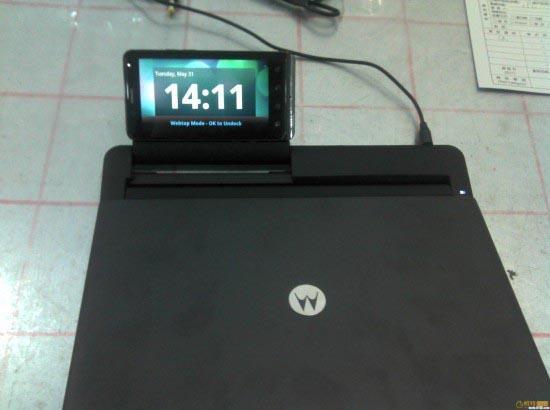
Despite all the functionality that manufacturers and designers shove into our smartphones, I still see it as a personal device that’s meant to supplement other devices. Specifically, since I use my phone as a means to check email, I see it as an extension of my computer, whether it’s a desktop or laptop. I respond to email primarily through my computer, but I check it, mark it as read or flag it to read again later, on my phone more often than not. It’s a natural extension to my day-to-day routine. This is actually why I can’t find a reason to slide a tablet into my life. I don’t need two devices to serve that purpose, right?
In any event, I can understand why some people might want to converge their devices a bit further. We’ve already gone from our dedicated MP3 players and cameras, even our calculators, and shoved them into our smartphones. So why wouldn’t we want to make sure that our computer’s basic functionality gets tucked away into those thin frames, too? It’s just a natural course of technology evolution, so I shouldn’t be too surprised that the BlackBerry CEO is talking about that specific future.
Or should I?
A few days ago, BlackBerry CEO Thorsten Heins took part in an interview with ABC’s Joanna Stern, and talked about how phones from his company could become the central computing destination for users. He actually goes as far as to say that he wants BlackBerry smartphones to replace dedicated tablets. And laptops. Here’s the quote, directly from the interview:
“We are talking about a mobile-computing experience that makes sure that for you as a user, you only have to carry one computing device,” he said. “Then you get peripherals around it that make your life much more easy than it is today carrying a tablet, carrying a smartphone, carrying a tablet, going to your office and having a desktop.”
Just before that, Heins points out that there is so much power in a device like the BlackBerry Z10 that carrying around those other devices just, simply, doesn’t make sense. For a moment, before we get too far into this, I’m going to admit that I understand where he is coming from. Why carry all those things around if you don’t have to? Just because you like rocking that bag? Okay, I’ll give you that, it’s a nice bag. But, why not leave the tablet at home, or even your laptop, if your phone can do it all?
Most of you, right now, should have another company in mind as we talk about this convergence between smartphones and laptops. That would be Motorola. And, in your head, you should see what that particular company called the “Lapdock.” It was, effectively, a laptop-like device that was literally powered by a Motorola-branded smartphone. Motorola went through two versions of the device before they ultimately closed the project down.
I picked up the Lapdock for the Motorola Bionic when it launched, and I used it for about five hours. As I just said, the idea is great, and I think it’s something that could definitely be expanded on in the future. But, the execution that we had in the past just wasn’t there. Back in September of 2011, I wrote a piece that Google Chrome should be the standard Web browser on a Lapdock. Both of those things, put together, made my experience with the Bionic’s Lapdock on the wrong side of “barely usable,” and ultimately left me wanting a lot more from the endeavor.
Is the time almost upon us? More to the point, is BlackBerry the company that’s going to figure it all out for us? That’s obviously what Heins believes, and no one can say that he doesn’t make good points in his case. While he’s obviously not spilling the beans on what his company is planning, or building, at this point, he does point out that they plan on showing their ideas off at BlackBerry World.
I’ve tried to come up with a reason why I might not like this methodology, but you know what? I can’t. I still like the idea. Even if I think the Lapdock wasn’t worth the time, I believe the landscape has changed pretty drastically. We’ve got a Chrome for Android that’s outstanding to use, and Safari on iOS is good enough for the most part, too. And, there’s no arguing that our smartphones are powerful enough to get the job done.
And apps? Yeah, we’ve got those, too. Apple’s Pages for the iPhone is great, and I use it to write articles more often than I ever thought I would. I did the same thing on Windows Phone, thanks to Microsoft Word. Our phones are capable of getting the job done, so having a natural means to extend that ability without ruining the experience is something I definitely think we can attain.
Again, though, I have to ask: Is BlackBerry the company to figure that out? I think they could be, simply because they’re working on it. If Heins is pushing an effort in converging these devices the same way that he is pushing excitement and development for BlackBerry 10, then I think there’s a good possibility that whatever they show off at BlackBerry World is appealing.
I’ve got something new to look forward to, at least.
What do you think? Would you trust the convergence of your smartphone, tablet and laptop to BlackBerry? Do you think they can create something worthwhile, that you’ll actually want to leave your tablet, or even your laptop, at home, in favor of your phone? If they’ve got a Lapdock-like device in the works, I think some people might suggest that bringing your laptop just makes more sense. Would you say the same? Let me know what you think.